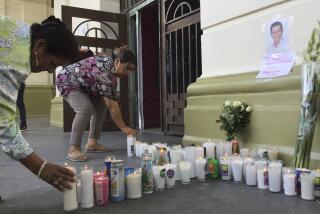Emergency is declared after coup attempt
- Share via
DILI, EAST TIMOR — Acting President Vicente Gutterres declared a state of emergency today after attacks on the country’s top leaders, a failed coup that left the president in “extremely serious” condition with gunshot wounds to the chest.
In a televised address, Gutterres said the order would allow authorities to ban demonstrations and raid homes without securing judicial permission for the next two days.
He spoke after surgeons at Royal Darwin Hospital in Australia worked during the night to remove bullet fragments from President Jose Ramos-Horta.
Dr. Len Notaros, the hospital’s general manager, spoke to the Australian Broadcasting Corp. this morning about the president’s wounds.
“His condition remains extremely serious but, by the same token, stable,” Notaros said.
Ramos-Horta, who won the 1996 Nobel Peace Prize for his nonviolent resistance to the decades-long Indonesian occupation, was shot in the chest and stomach by gunmen in two cars around dawn Monday, officials said.
Rebel soldiers separately attacked Prime Minister Xanana Gusmao’s motorcade an hour later. He escaped unhurt.
The country’s top fugitive, Alfredo Reinado, and one of his men were killed in the attack on the president. One of the president’s guards also died.
Ramos-Horta, 58, first underwent surgery at an Australian army hospital in East Timor before being sedated, attached to a ventilator and airlifted to the hospital in Darwin.
Notaros said Ramos-Horta’s wounds indicated that he had been shot two or three times. The most serious wound was to the lower part of his right lung near his liver, and would probably require more surgery. There was also a risk of sepsis, Notaros said.
Gusmao called the attacks a well-planned operation intended to “paralyze the government and create instability.”
“I consider this incident a coup attempt against the state by Reinado, and it failed,” Gusmao said. “This government won’t fall because of this.”
Reinado was among 600 mutinous soldiers dismissed by the government in 2006 -- a move that triggered gun battles between security forces that later spilled over into gang fighting and ethnic unrest.
At least 37 people were killed and more than 150,000 forced from their homes in the unrest, which also led to the resignation of the first post- independence prime minister.
The streets of Dili, the capital, were calm after the attacks. Gusmao said an overnight curfew was in place. The United Nations, which controls security in the country, said checkpoints had been set up on main roads.
A rapid response unit of 120 Australian troops, backed by a navy frigate, was to arrive in Dili today to join the multinational security force.
More to Read
Sign up for Essential California
The most important California stories and recommendations in your inbox every morning.
You may occasionally receive promotional content from the Los Angeles Times.










